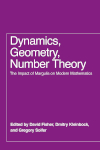- About MAA
- Membership
- MAA Publications
- Periodicals
- Blogs
- MAA Book Series
- MAA Press (an imprint of the AMS)
- MAA Notes
- MAA Reviews
- Mathematical Communication
- Information for Libraries
- Author Resources
- Advertise with MAA
- Meetings
- Competitions
- Programs
- Communities
- MAA Sections
- SIGMAA
- MAA Connect
- Students
- MAA Awards
- Awards Booklets
- Writing Awards
- Teaching Awards
- Service Awards
- Research Awards
- Lecture Awards
- Putnam Competition Individual and Team Winners
- D. E. Shaw Group AMC 8 Awards & Certificates
- Maryam Mirzakhani AMC 10 A Awards & Certificates
- Two Sigma AMC 10 B Awards & Certificates
- Jane Street AMC 12 A Awards & Certificates
- Akamai AMC 12 B Awards & Certificates
- High School Teachers
- News
You are here
Dynamics, Geometry, Number Theory

Publisher:
University of Chicago Press
Publication Date:
2022
Number of Pages:
496
Format:
Hardcover
Price:
75.00
ISBN:
9780226804026
Category:
Collection
[Reviewed by , on ]
Benjamin Linowitz
05/10/2022
Gregory Margulis is a mathematician of incredible breadth and originality. His work in the early 1970's on discrete subgroups of semisimple Lie groups transformed the field and solved a number of important open problems that had long been considered out of reach. Around the same time he employed the representation theory of the group \( SL_2(Z_p) \) in order to construct the first explicit examples of expander graphs. Later, in 1987, Margulis proved the Oppenheim conjecture, a problem in Diophantine approximation, by developing an approach making extensive use of dynamics on homogeneous manifolds. Throughout Margulis' career he has developed a (well-deserved) reputation for proving deep theorems that revolutionize their field and that have important applications to many other fields of mathematics.
The book Dynamics, Geometry, Number Theory is dedicated to the work of Margulis and aims to provide its readers with introductions to the various fields that Margulis worked in. The book is a collection of papers and survey articles that are organized into four parts. The first two parts concern aspects of the theory of discrete subgroups of semisimple Lie groups. The third part concerns representation theory and spectral theory, while the fourth part (the longest) deals with homogeneous dynamics. The articles in the collection tend to be either reimaginings of the proofs of some of Margulis' seminal results (e.g. Bader and Furman's new proof of the superrigidity theorem) or else survey articles that trace the influence of Margulis' work over time and point out numerous open problems. All of these articles are very well-written. Two that I especially enjoyed were Fisher's essay Superrigidity, arithmeticity, normal subgroups: results, ramifications, and directions, and Breuillard and Lubotzky's essay Expansion in simple groups.
Margulis is without a doubt one of the most influential mathematicians of the past fifty years. The book Dynamics, Geometry, Number Theory is vast in scope and provides an excellent introduction to Margulis' work and the research that it has inspired. It will be of great interest not only to specialists, but to graduate students and researchers interested in ergodic theory, Lie theory, geometry, and number theory.
Benjamin Linowitz (benjamin.linowitz@oberlin.edu) is an Assistant Professor of Mathematics at Oberlin College.
See the publisher's website.
- Log in to post comments




